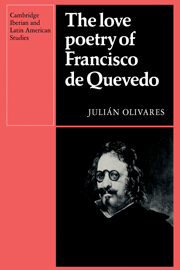4 - Quevedo and Neoplatonic love
Published online by Cambridge University Press: 05 November 2011
Summary
The study in chapter 2 of sonnets 457,484,458 established Quevedo's prima facie recognition of Neoplatonic love. By this ‘new’ ideal the virtuous lover aspires to a further purification of his love; and by making it intellectual he also attempts to overcome the corporal affliction caused by the courtly tradition. In a good majority of Quevedo's love lyrics, however, we note that the poet cannot deny his corporal passion, nor in his conscience can he embrace an ideal attempting to overcome it. Most of his poetry dealing with Neoplatonic love, therefore, either treats it with irony or expresses the grief caused by its too abstract nature.
CORPORAL REACTION AND IRONY
González de Salas has given sonnet 331 the title of ‘Amor que sin detenerse en el afecto sensitivo pasa al intelectual’ (‘A love which, without delaying at the sensitive level, passes on to the intellectual’):
Mandóme, ¡ay Fabio!, que la amase Flora,
y que no la quisiese; y mi cuidado,
obediente y confuso y mancillado,
sin desearla, su belleza adora.
Lo que el humano afecto siente y llora,
goza el entendimiento, amartelado
del espíritu eterno, encarcelado
en el claustro mortal que le atesora.
Amar es conocer virtud ardiente;
querer es voluntad interesada,
grosera y descortés caducamente.
El cuerpo es tierra, y lo será, y fue nada;
de Dios procede a eternidad la mente:
eterno amante soy de eterna amada.
- Type
- Chapter
- Information
- The Love Poetry of Francisco de Quevedo , pp. 90 - 112Publisher: Cambridge University PressPrint publication year: 1983

